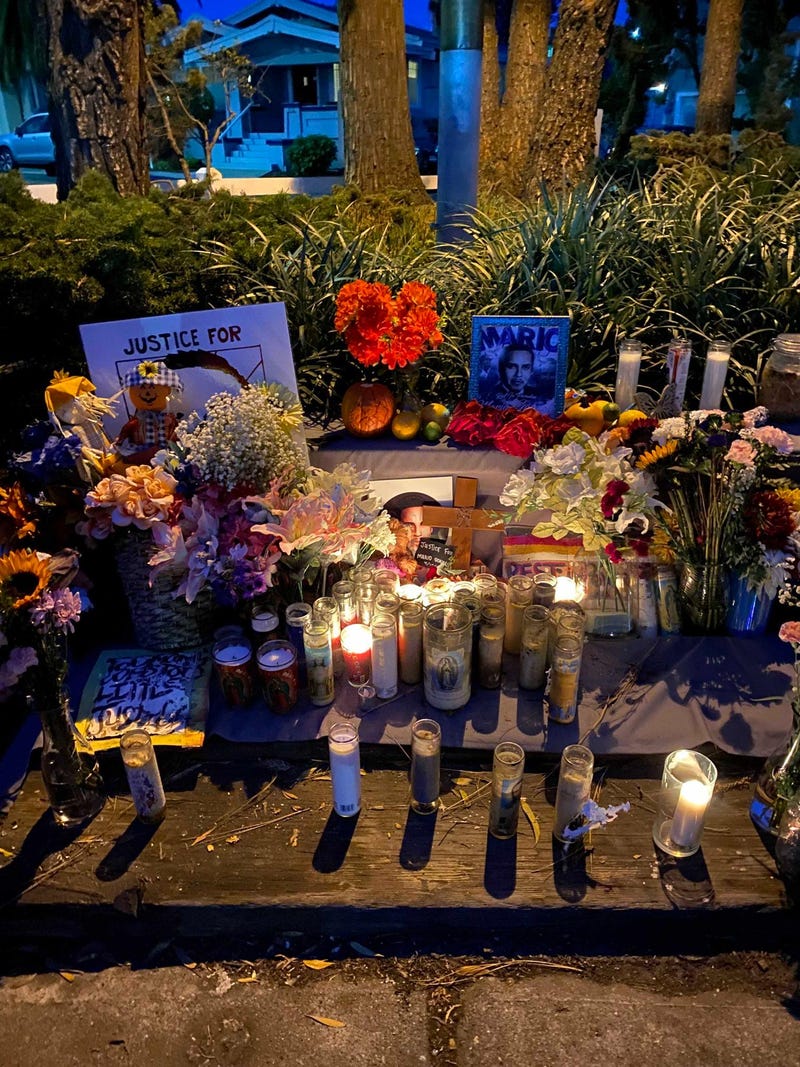
Mario Gonzalez's death in Alameda police custody this April, which his family compared to George Floyd's in Minneapolis last year, has been ruled a homicide, according to a coroner's report released on Friday.
Bodycam footage showed officers pinning Gonzalez, a 26-year-old Oakland resident, on the ground for about five minutes before he went limp. In the autopsy report released on Friday, nearly eight months after Gonzalez's death, forensic pathologist Vivian Snyder wrote that Gonzalez likely experienced cardiac arrest due to the "toxic effects of methamphetamine," while the "physiologic stress" of the officers' restraint "placed further stress" on his heart.

"The Alameda County District Attorney's office has the responsibility now to determine whether charges are appropriate against the individuals involved," Alameda Police Chief Nishant Joshi wrote in a statement on Friday. "While we wait for the District Attorney's office to make their decision and with the knowledge of the Coroner's report, the City will work diligently towards completing its ongoing independent investigation and take appropriate action."
Alameda police officers Eric McKinley, James Fisher and Cameron Leahy, as well as parking enforcement worker Charlie Clemmens, all remain on administrative leave pending the results of an investigation, Joshi said. City officials identified the four at the end of April, all of whom were recorded pinning Gonzalez to the ground using their body weight.
Neither the Alameda County District Attorney's office, nor an attorney representing the four officers, responded to KCBS Radio’s request for comment prior to publication.
McKinley spoke to Gonzalez for about nine minutes, following a report of a man experiencing a potential "psychiatric emergency." He and another officer attempted to handcuff Gonzalez after he tried to put his hands in his pockets, according to the autopsy report, before the pair, another officer and the parking employee restrained the 26-year-old on the ground.
Gonzalez's autopsy was conducted on April 21, according to the report. Snyder determined that his morbid obesity and alcoholism also contributed to his death two days prior.
"The methamphetamine detected in his blood combined with his enlarged and dilated heart could have together resulted in a fatal cardiac arrhythmia," Snyder wrote. "During the interaction with law enforcement agents, he was face down on the ground (prone) with his hands handcuffed behind his back, and at times the officers were applying pressure to his torso and legs with at least some of the weight of their bodies."
Julia Sherwin, one of the attorneys representing Gonzalez and his 5-year-old son, wrote in an email to KCBS Radio on Monday night that the officers, rather than the methamphetamine, killed Gonzalez. Sherwin claimed Gonzalez a "small, recreational" amount of the drug in his system when he died, calling for District Attorney Nancy O'Malley to press charges against the officers.
Sherwin wrote that Gonzalez's son "will hold the officers accountable for Mario's death through a federal wrongful death civil rights lawsuit; but only Nancy O'Malley and an Alameda County jury can hold the officers criminally accountable."
An attorney representing Gonzalez's mother, Edith Arenales, didn't respond to KCBS Radio's request for comment prior to publication.
Eight days after his death, Gonzalez’s brother, Gerardo, told reporters that "police killed my brother in the same manner they killed George Floyd" on Memorial Day in 2020.
"They had their weight on his head and his back," Gerardo Gonzalez said in April. "He was complying and they continued to pin him down with their weight."

